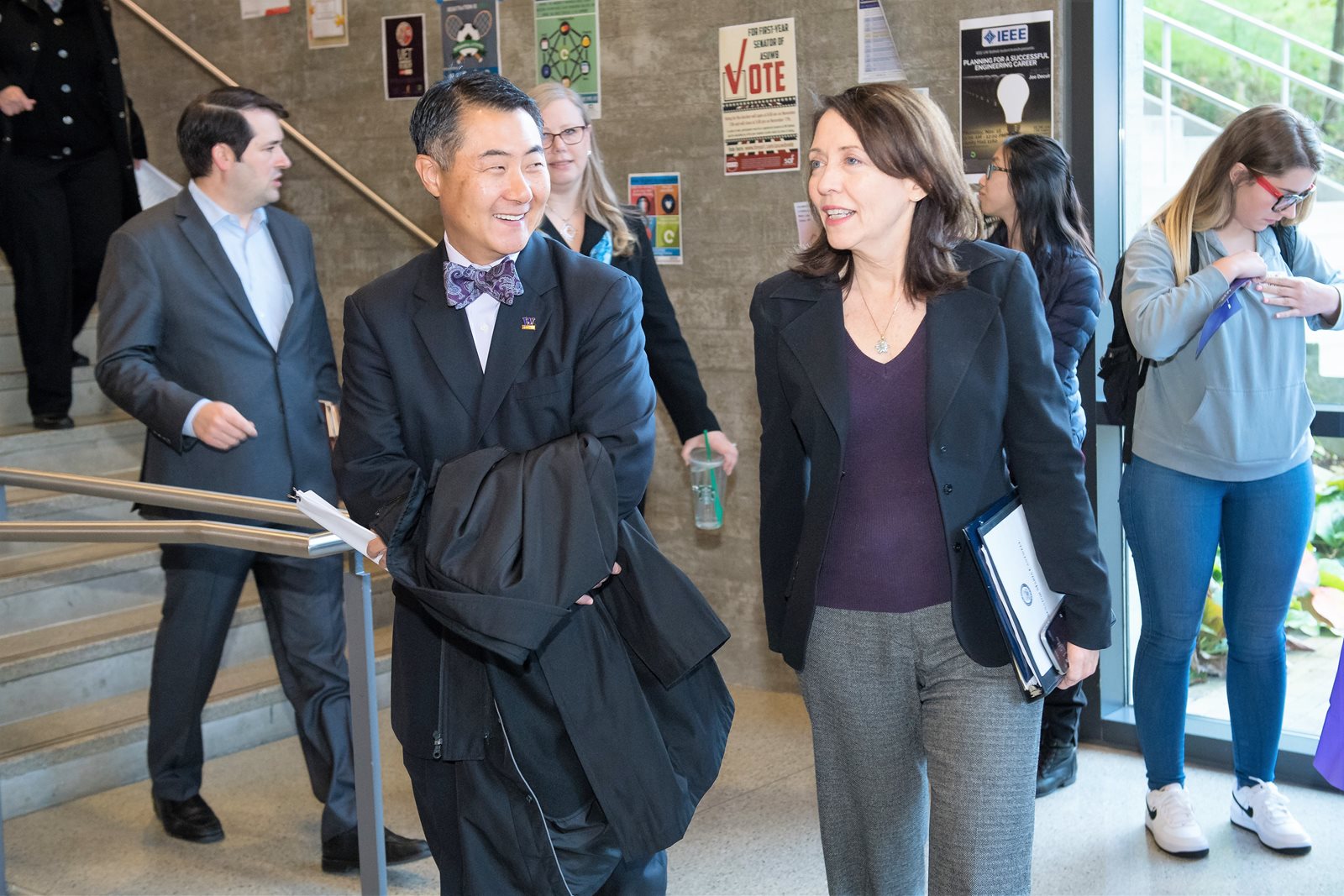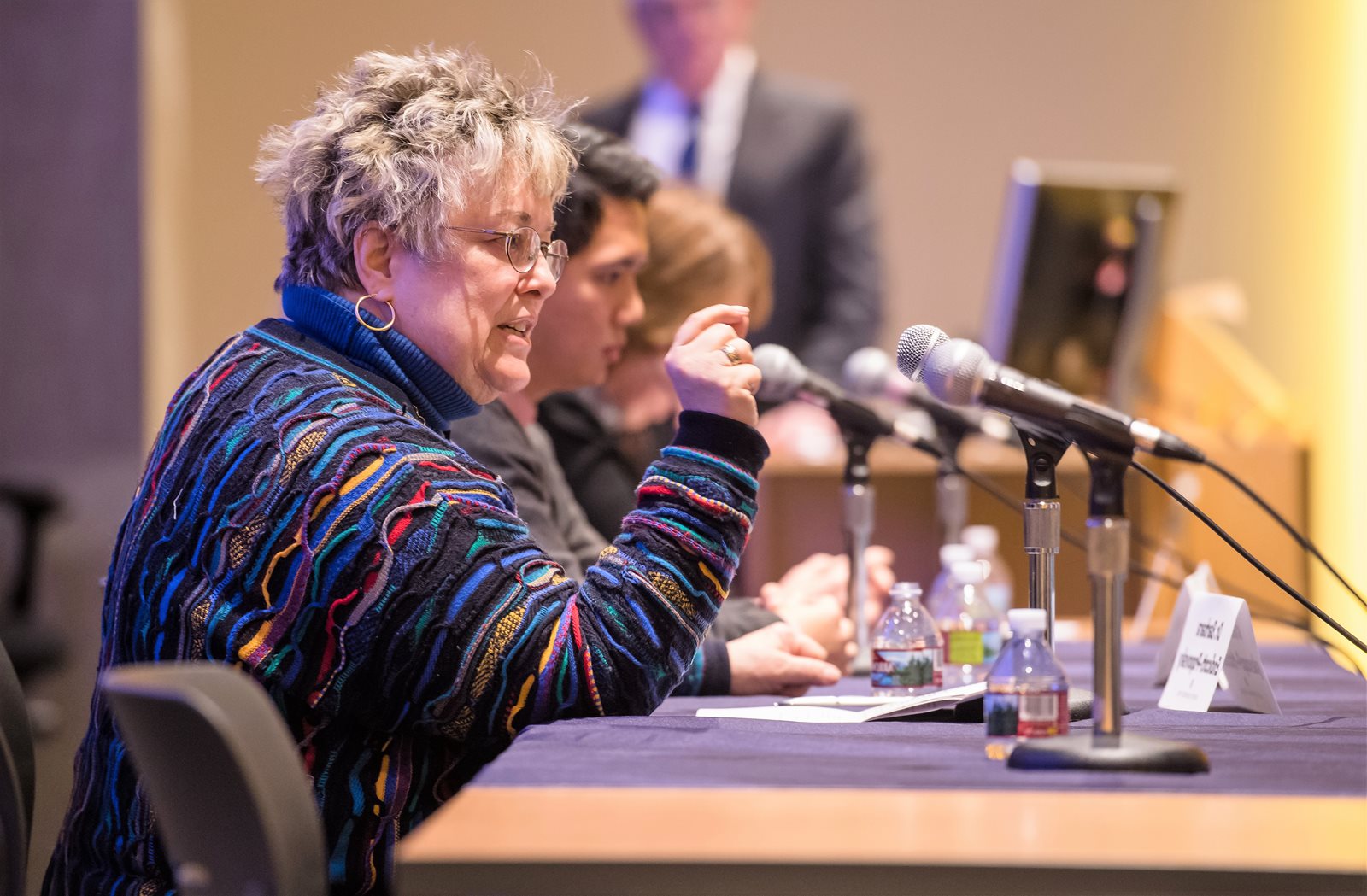What does it take to thwart cyberattacks that could wreak havoc from personal bank accounts to national power grids? It takes a network — a knowledge network of people skilled in assuring information security and prepared to step into a breach.

The severity of the threats, the range of targets and the need for skilled professionals was clear at a symposium on energy workforce cybersecurity attended by Sen. Maria Cantwell, above, Nov. 17 at the University of Washington Bothell.
In 1957, when the Soviet Union launched Sputnik — the first satellite to orbit the earth — it raised an alarm that the United States had a serious technology gap.
“I really do believe, just as there was a Sputnik moment in our country’s history, and we responded, there is the same moment now on cybersecurity,” Cantwell told symposium participants.
“Attacks are likely in the works even right now that could disrupt our electricity grid, water and sanitation lines, national gas supplies, and communication and information infrastructure,” Chancellor Wolf Yeigh said in his opening remarks. “The question is, ‘Will we be prepared?’”
UW Bothell is prepared to serve as a convener of researchers, educators, government and industry officials to work on solutions, said Yeigh. The University also is committed to help close the gap between the needed talent and the available workforce, he said.

Photo: Chancellor Wolf Yeigh walks to the symposium with Sen. Maria Cantwell. (Marc Studer photos)
In recognition of its successful government-industry-academic programs, UW Bothell was selected to host the National Security Agency (NSA) 2018 Cyber Summit Executive Leadership Forum in April 2018.
The symposium featured two panels of experts from government, industry and higher education — one to outline the most pressing problems and the other to explore possible solutions. The cross-sector symposium was the first of its kind since Cantwell called for such events at a Senate hearing in October on cybersecurity. Cantwell is the ranking Democrat on the Senate Energy Committee.
“Cybersecurity is an issue that keeps me up at night,” Cantwell told panelists and the audience, which also included students, community members and local business owners. A cyberattack on the nation’s energy grid could cause a blackout that could harm our economy, unless we make the necessary investments in cyber defense, she said.
“A critical piece of the investment, though, is to have a workforce, and that’s why we’re here at UW Bothell. The efforts that you’re doing are so key to that,” Cantwell said.
The challenge facing the region and the country is to grow the workforce at a faster pace in order to match the thousands of open and hard-to-fill positions in the energy sector alone. “Getting the right workforce, getting them skilled on the right procedures, focusing on cyber hygiene is something we all need to do,” Cantwell said.
The University is developing a pipeline of talent to help fill that gap, said one of the panelists, Barbara Endicott-Popovsky, left, director of the Center for Information Assurance and Cybersecurity (CIAC), which is based at UW Bothell. The center works with the NSA on research, education and partnerships with industry to accelerate a workforce ready to step into a cybersecurity breach. UW Bothell also offers a Master of Science in cyber security engineering and a Bachelor of Science in computer science and software engineering.

Indeed, cybersecurity is now becoming a profession of its own, Endicott-Popovsky said, complete with educational standards and assessments, national organizations and professional development opportunities.
Demanding and high-paying jobs in cybersecurity — or that deal with cybersecurity concerns — need graduates from a variety of disciplines, not just computer technology. As many panelists noted, the challenge of ensuring cybersecurity encompasses other fields, such as business, and complicated issues, such as privacy. And it needs people who can evolve with changing threats.
“The field is not a destination, it’s a process,” said Endicott-Popovsky.
Here are the symposium panel participants:
Panel 1: National Need and Regional Concerns
• Moderator: Bill Boni, T-Mobile, vice president information security
• Bill Pike, division director for computing and analytics, Pacific Northwest National Labs
• Col. Kelly Hughes, senior cyber adviser to the Joint Forces Command, Washington National Guard
• Eileen Figone, Puget Sound Energy, director information technology security
• Devon Streit, U.S. Department of Energy, deputy assistant secretary for infrastructure security and energy restoration
• Anil John, Department of Homeland Security, CIAC program manager
• Dean Glavez, Snohomish County Public Utilities District chief information officer
Panel 2: Address Critical Needs and Concerns
• Moderator: Michael P. Meotti, executive director, Washington State Student Achievement Council
• Barbara Endicott-Popovsky, executive director, Center for Information Assurance and Cybersecurity, University of Washington Bothell
• Elaine Scott, dean of the School of Science Technology Engineering & Mathematics, University of Washington Bothell
• Corrinne Sande, director, computer science and information systems\CyberWatch West, Whatcom Community College
• Michael Su, analyst, cyber security management office, T-Mobile



